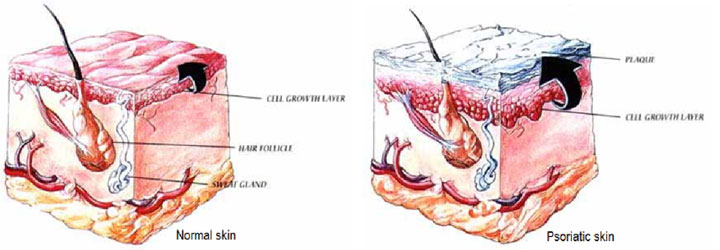Causes and Triggering elements
Psoriasis is an autoimmune genetic disease caused by a wrong activity of lymphocytes T – which are responsible of the defence of our body – that leads to a severe mistake in the immune system. More specifically, the lymphocytes react against the skin cells, causing the inflammation and an accelerated reproduction of skin cells.
The theory of a genetic origin is supported by the fact that about 50% of psoriatic patients have other cases of psoriasis in their families. Moreover, in the case of monozygotic twins – i.e. with the same genetic heritage and physical characteristics – psoriasis affects both brothers in 65-70% of cases.
A recent study made by a group of researchers of the University of Rome TorVergata - headed by Prof. Novelli - demonstrated the polygenic origin of the disease that involves several genes.

However, psoriasis is not only linked to genetics. There are often other causes, such as:
Stress
A set of reactions triggered by our brain after a dramatic or physically/psychologically dangerous event.
Trauma
In people with a predisposition, any kind of physical trauma, e.g. scratches, burns, surgical scars, accidental blows, etc. may lead to the onset of psoriatic spots in the same points. This is called the Koebner phenomenon and may occur even one or two weeks after the event.
It seems that it is not only a matter of intensity of the blow, but that psoriasis may be triggered also by the frequency of the event.
Drugs
Some medicines may trigger the disease, such as lithium-based drugs, beta-blockers and anti-malarial drugs.
Throat infections caused by beta-haemolytic streptococcus are often linked to the onset of psoriatic spots in children, whilst in adults beta-haemolytic streptococcus worsens the disease and is associated to a greater resistance to drugs
Alcohol and smoking
The most severe forms of psoriasis are often associated with alcohol abuse and nicotine.
Changes in the metabolism
A change in some metabolic processes and a diet with a low level of calcium may be responsible for the onset of psoriasis.



